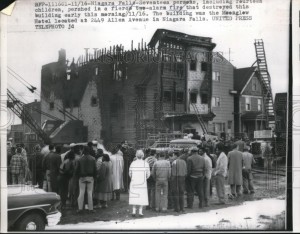For some, last weekend’s torching of the Midtown Inn on Niagara Street brought to mind the Moonglow Hotel fire of November 1957. But while the destruction of the troubled Midtown may even be seen as something of a public service, the catastrophic Moonglow fire – which left 18 people dead including 15 children, was an epic tragedy that will never be forgotten.
The Moonglow was a decrepit rooming house that had recently been reopened by its’ owner, William Dietz, who was said to have bought the building in order to tear it down, as he was in the demolition business.
Dietz rented rooms to members of the city’s rapidly expanding African American community, mostly recent arrivals from the South who sought employment in the hospitality industry here.
Frances Haynes, who lives across Allen Avenue from the Moonglow, said the sound of an explosion awoke her around 4:30 a.m. on November 16.
She looked out and “saw flames pouring out of a window on the second floor of the house across the street.” By the time she had awakened others in her own house, “we looked again and the entire building was in flames.”
Ironically, it was Dietz’s father, Niagara Falls Police Traffic Division Capt. Jack Dietz who was on routine patrol in the neighborhood when he saw flames bursting out of his son’s building at 2449 Allen Ave.
He quickly called for an alarm, bringing a brigade of firefighters to the three-story tenement structure. Despite their efforts, the Moonglow Hotel fire remains the deadliest in the city’s history.
The case attracted statewide attention being it was the first time a homeowner was charged under the multiple residence law, in violation of provisions requiring fireproof doors and partitions.
Investigators discovered the building had no central heating system and tenants were using electric heaters and kerosene stoves to keep warm. Mention also was made about nailed down windows and lack of proper lighting in the building, police said.
According to articles published in the Niagara Gazette after the fire, William Dietz was indicted by a 24-member grand jury Dec. 11, 1957, on charges of first- and second-degree manslaughter. He was released on a $10,000 property bail bond.
The indictment came after the jury heard testimony from 42 people in a probe into the fatal fire conducted by District Attorney William H. Earl. Dietz’s indictment charge claimed he violated multiple residence laws, and charged criminal negligence for allowing overcrowded conditions to exist inside the property.
Deitz claimed he didn’t collect rent from the families and only agreed to let them stay there temporarily as an alternative to being homeless during the winter months after Hyde Park Village closed down.
In March 1958, a jury of 10 men and two women convicted Dietz on the first-degree manslaughter charge for “culpable negligence in maintaining the building in violation of multiple housing law,” according to reports.
Genesee County Judge Philip J Weiss sentenced Dietz to two to five years at Attica State Prison. He finished his sentence at Auburn State Prison.
Dietz, passed away in 1989.





















